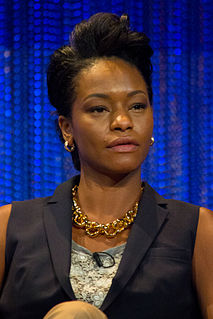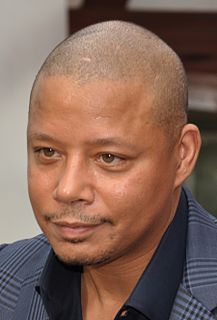A Quote by Sufe Bradshaw
If you think about 'Person of Interest' with Taraji P. Henson or 'Scandal' with Kerry Washington - any of those black women could have been any race; they just happen to be black. And those are the characters that I'm more attracted to. It's not so much about separation of race, but really, more uniting us.
Related Quotes
It's the culture, not the blood. If you can go anywhere in the world and adopt these babies and put them into households that were already assimilated in America, those babies will grow up as American as any other baby with as much patriotism and love of country as any other baby. It's not about race. It's never been about race. In fact the struggles across this planet, we describe them as race, they're not race. They're culture based. It's a clash of culture, not the race. Sometimes that race is used as an identifier.
I felt like it was a courageous show [Black-ish] from the beginning. We are a black family - we're not a family that happens to be black. But the show is not even about us being black. The show is about us being a family. That is groundbreaking - on TV, the black characters either happen to be black or they're the "black character," where everything they say is about being black. I think that's the genius.
For black America needs a politics whose first mission isn't the reinforcement of the idea of black America; and a discourse of race that isn't centrally concerned with preserving the idea of race and racial unanimity. We need something we don't yet have: a way of speaking about black poverty that doesn't falsify the reality of black advancement; a way of speaking about black advancement that doesn't distort the enduring realities of black poverty.
Diversity worship and multiculturalism are currency and cause for celebration at just about any college. If one is black, brown, yellow or white, the prevailing thought is that he should take pride and celebrate that fact even though, just as in the case of my eye color, he had nothing to do with it. The multiculturist and diversity crowd see race as an achievement. In my book, race might be an achievement, worthy of considerable celebration, only if a person was born white and through his effort and diligence became black.
We have African-Americans and black people getting behind the scenes more and more, we get true black images in television and film...because we have black people behind them. They can tell stories from those points of view and bring to life those characters who have yet to be shown. As long as we have people behind the camera just as much as in front of the camera doing the work, then we'll always be good.
Intersectionality has made an important contribution to social and political analysis, asking all of us to think about what assumptions of race and class we make when we speak about "women" or what assumptions of gender and race we make when we speak about "class." It allows us to unpack those categories and see the various kinds of social formations and power relations that constitute those categories.
I get that racism exists, but it's not a catalyst for my content. I don't need to talk about race to have material. My style of comedy is more self-deprecating. I think that makes me more relatable. When you deal with 'topics' - race, white versus black - you're not separating from the pack. You're doing what everybody else is doing.




































